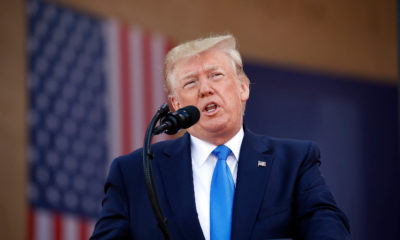World
Calls to stop Trump’s visit to UK
London: Calls are being made to cancel a proposed state visit to the UK by American President Donald Trump after he signed an order banning refugees and citizens from seven Muslim-majority nations from entering the US, the media reported on Monday. The petition to UK government to stop Trump’s visit has gathered over 903,834 signatures as of early Monday morning, far more than the 100,000 needed for Parliament to consider a debate, the Telegraph reported. However, Downing Street sources confirmed that Prime Minister Theresa May will not be withdrawing her invitation to Trump because it remains “substantially in the national interest”.
Labour leader Jeremy Corbyn said it would be “totally wrong” for the visit which was announced during May’s trip to the US last week, to go ahead later this year. Speaking to ITV on Sunday, Corbyn said: “I think we should make it very clear we are extremely upset about it, and I think it would be totally wrong for him to be coming here while that situation is going on.” “I think he has to be challenged on this. I am not happy with him coming here until that ban is lifted, quite honestly.” Liberal Democrat leader Tim Farron backed the call.
He said: “Any visit by President Trump to Britain should be on hold until his disgraceful ban comes to an end.” “Otherwise, Theresa May would be placing the Queen in an impossible position of welcoming a man who is banning British citizens purely on grounds of their faith.” Alex Salmond, the Scottish Nationalist Party’s foreign affairs spokesman, said he thought the state visit of Trump was “a very bad idea”. “You shouldn’t be rushing into a headlong relationship with the President of the US,” he said to Sky News on Sunday.
World
Lockdowns in China Force Urban Communities to Defy Censorship and Vent Frustration Online

Shanghai’s rich middle class is leading a wave of online dissent over the strict and prolonged lockdowns imposed in various parts of the country. Chinese internet censorship is struggling as patience is wearing thin in many urban centers, coming up with creative forms of online protests.
Social Media Posts Revealing Lockdown Tension in Shanghai
Drawn-out lockdowns are nothing new in China as authorities insist with the nation’s zero-Covid policy since the start of the pandemic. Currently over This time around, however, metropolitan areas like Shanghai are increasingly difficult to keep quiet, given that its more than 25 million residents have seen weeks of total isolation along with food shortages and many other service interruptions.
Dozens of towns and reportedly over 300 million Chinese citizens have been affected by lockdowns of different severity. As expected, urban netizens have been most outspoken over their difficulties by finding creative ways to get around state censorship and bans placed on topics, news comments and spontaneous campaigns.
Shanghai residents have been using mobile proxies and hijacking seemingly unrelated hashtags to talk about healthcare issues, delivery failures and the overall severity of their situation. The “positive energy” that the Chinese government wants to transmit during the recent prolonged series of lockdowns does not come naturally to those counting food supplies and online censors are working hard to filter words, trending topics and undesired social media sharing.
WeChat groups and message threads are under constant monitoring. Posts questioning the zero-Covid approach have been quickly deleted, including by leading Chinese health experts like Dr. Zhong Nanshan. Video footage is soon censored and protests and investigations are quickly made to disappear.
Where this has not worked, officials have exposed banners with warnings and outright threats like “watch your own mouth or face punishment”, while drones have been patrolling the city skies. Yet, if anything, this has led to further tensions and unspoken confrontation with Shanghai’s educated and affluent middle class.
Creative Online Solutions Harnessing Civic Energy
Announcements by Chinese social media that they would be publishing the IP addresses of users who “spread rumors” have not helped either. Tech industry research has shown that much of Asia’s tech-savvy population has a habit of using mobile proxies and other privacy tools, quickly finding workarounds to browse the internet freely and talk to the world about the hottest topics.
The sheer volume of forbidden posts is already a challenge for the very censorship system, experts explain. Unable to track all trending hashtags, state workers overlook topics that speak about the US, Ukraine or other popular news. Linking human rights elsewhere to their situation, Chinese online dissidents establish their informal channels and “hijack” the conversation to share personal or publicly relevant information about the Covid suppression in their town.
Sarcastic and satirical posts still dominate. Others hope to evade the censors by replacing words from famous poems or the national anthem. One thing is certain – social media, when harnessed with the right creativity, has proven its ability to mount pressure on the government in even some of the most strictly controlled tech environments like China.
























